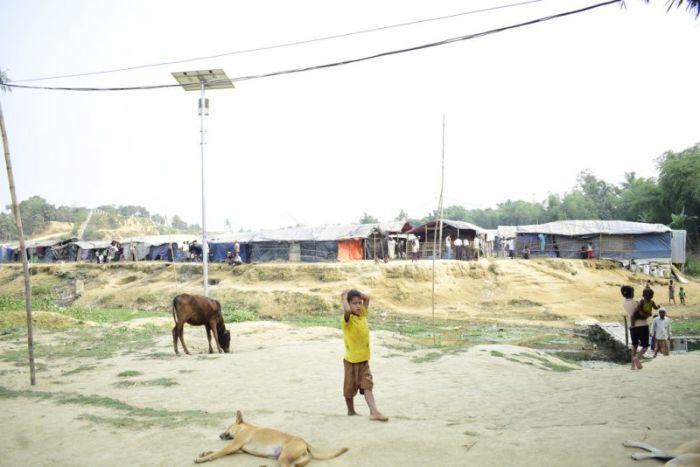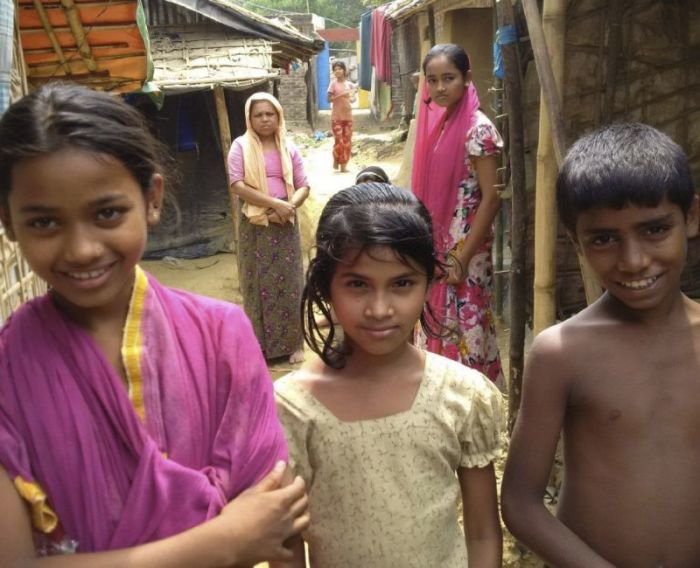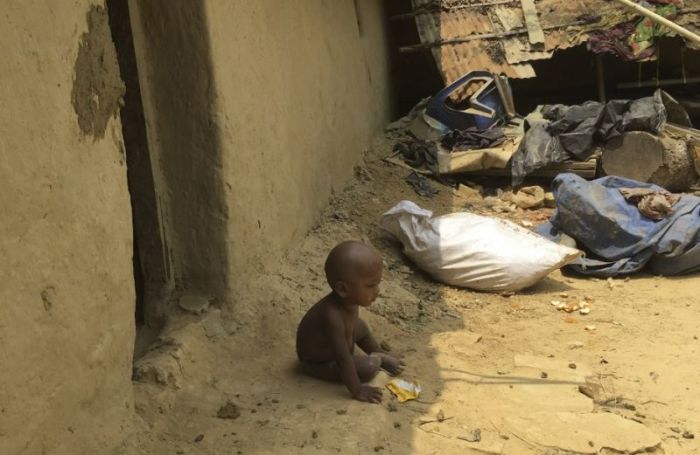Rohingya Crisis: Babies Chopped in Half, Mothers and Daughters Gang Raped

Buddhist, Christian, Jewish and Muslim clergy recently traveled to Bangladesh and spoke with dozens of the Rohingya Muslim refugees who were among the estimated 700,000 who fled genocidal violence committed by the Myanmar government last year and are now sharing the horrors that innocent families have faced.
Sixteen members of the recently founded Faith Coalition to End Genocide in Burma (also known as Myanmar) took part in the multi-day trip to learn more about the dire situation and spread awareness within their spheres of influence in the United States.
The United Nations estimates that over 670,000 Rohingya refugees have fled to Bangladesh from the Rakhine state since August 2017, when Burmese military forces attacked and destroyed their jungle villages, killed thousands of men and babies and systematically gang-raped the women.
Muslim imam Malik Mujahid, one of the coalition's organizers, told The Christian Post on Thursday that there are still as many as 500 to 600 Rohingya refugees per week who are making their way to Bangladeshi refugee camps in the border town of Cox's Bazar.
Although the refugees are living in small huts held up by thin strips of bamboo, have to bathe in water pumps, and have a lack of access to jobs, money, education and medicine, they, at the very least, feel safe in their new temporary living situations.
"I asked people multiple times why they came," Mujahid said, adding that he and the coalition members spoke with over 60 refugees at five different camps.
"They said, 'Well, they shot us.' In some cases, the village chair told them to leave or they heard that neighboring villages are being attacked. Women say that their neighbors were raped, so they left."
As the government in the majority-Buddhist nation has worked for years to strip the citizenship and rights away from the indigenous Rohingya community, trip attendee Nicolee Ambrose told CP that the military onslaught against the Rohingya community that began last August was simply "the final stage" of a mission to eradicate the minority from their ancestral homelands.
"The Burmese military clearly viewed that there would not be repercussions if they did this and they did it," Ambrose said.
What the government troops did, Ambrose said, was systematically surround Rohingya villages in their ancestral homeland and attack.
Ambrose said that many of the stories she heard were similar. In most situations, the military would go into the village, kill all the men, separate the women and brutalize them.
On separate occasions she was told of how the Rohingya women would be split up into groups of five or six and gang-raped by as many as 10 different men.
According to Ambrose, the U.N.'s figures show that about 52 percent of the women who survived also reported having been raped.
Ambrose, a Christian who serves as the Republican National Committeewoman for Maryland, recently wrote about her experiences in Bangladesh.
She told the story of one refugee child named Moriom, whom she said was dressed in a Princess Aurora-like pink dress when she met her. Despite the child's innocence, Ambrose would later learn that the 13 year old had been gang-raped along with her mother by 10 men.

Today, Moriom lives in the refugee camp without a family since her mother and the rest of her family members have died.
"When you hear that she not only had to endure this brutality and then see her family either be killed in front of her eyes or die from the repercussions of it, then you realize that not only did she have to live through that, but also for the rest of her life she has to deal with STDs from what these disgusting creatures did to her," Ambrose explained. "I personally feel an obligation to make sure everyone understands what is going on. This is totally unacceptable."
Ambrose said that she was also told of multiple babies being killed in some of the most horrifying ways.
"The way in which they killed these babies was just full of rage and hatred," she said. "It is hard for me to fathom someone who would chop a baby in two pieces and throws the baby in a river or throws the baby into a fire. This happened across the board in these villages."
Ambrose wrote of one account where a woman clung to her 1-year-old baby as soldiers stabbed her in the head and chest and even tried to slit her throat. After finally freeing the baby away from the mother, Ambrose said that the soldiers smashed the baby's head into the ground and killed it instantly.
For that Rohingya mother, all of her children were killed.
"In the camps I had the best time playing with a bunch of 4- to 8-year-old children," Ambrose said. I can only imagine that they were carried off to escape into a river or forest to run away," she said. "There are just many accounts of these babies being ripped out [of their] mothers' hands and killed."

Ambrose said that from what she could tell, the troops were joined by the civilian population in persecuting the Rohingya. The Myanmar/Burmese government, she explained, used Facebook and social media to drive cultural opposition to the Rohingya community.
"This is, culturally, like you see in many brutal dictatorships, where they try to find a common enemy," she said. "They have painted the Rohingya or anyone who is an ethnic minority, whether it is a Rohingya, Christian, a Hindu."
According to Ambrose, there is a saying in Myanmar: "If you are in the jungle and you meet a Rohingya and a snake, who should you kill first? You kill the Rohingya first."
"We estimate that 100,000 Rohingya were killed [since August 2017]," Ambrose said. "It could be even higher but we don't know because they are not letting us in to look at the Rakhine state. But it is clear that the death tolls would be close to 1 million had Bangladesh decided not to let these refugees in."
Mujahid added that the fact that the Myanmar government was able to commit genocide without any relative repercussions sets a dangerous precedent.
"The Burmese are bragging that they have eradicated 90 percent of the Rohingya community. That region is full of ethnic minorities that are not popular," he said. "If we allow this to happen in Burma, what is to stop it from happening in all the other countries that have religious minorities?"
Mujahid added that the Myanmar government also has plans to eradicate other minorities, such as Baptists and other Christians.
"If it is considered genocide, all parties to the [Genocide Convention] need to interfere to stop it. We need to set an example. If we allow it to go on, it has repercussions," he said. "For example, there are groups inside Burma who are being bombed, some of them are actually Baptist Christians. The military was successful in this so they want to try this on other people."
As far as a long-term solution, Mujahid and Ambrose think Prime Minister Sheikh Hasina's plan calling for a U.N. safe zone for the Rohingya in their native land is the best option.
"It's really inexcusable that the Burmese can just get away with this — committing genocide and then taking over these people's land where they have lived for two millennium," Ambrose said. "We really like the prime minister's suggestion that the United Nations oversee this to make sure they are safe."
As for a short-term action, the clergy are calling on the U.S. to reinstate sanctions on Myanmar. Resolutions have been introduced in the House and Senate to do just that.
"I think [the] U.S. needs to take a stronger position. I think comprehensive sanctions is the way to go," the Muslim leader said. "President [Barack] Obama made a major mistake. All human rights organizations didn't want sanctions to be lifted. He lifted them. That gave license to kill to the military and they did. So there is a little bit of blood on President Obama's hands for making unwise decisions and not listening to anybody and worrying about his legacy."
The hundreds of thousands of Rohingya refugees now have nowhere to turn, having been pushed out of their ancestral homelands and stripped of their citizenship in 1982.
According to Mujahid, the clergy are concerned that as many as 200,000 of the refugees could be at serious risk of losing their lives due the risk of landslides and sewage mixing with water in the soon-approaching monsoon season.
Mujahid is also calling on the U.S. Navy to position its 50 ships in the South China Sea so that they can quickly respond should a disaster occurs.
"They need to be positioned in a way that if disaster struck, our helicopters and other boats are available to assist Bangladesh in rescuing people," he said. "This disaster is about to happen and people need to prepare for it."




























